Top 10 Movie Twists
The following list—taken only from movies I’ve seen, of course—constitute the ten movies with the most mind-blowing twists of all time. A story doesn’t need a good twist to be great (there’s something to be said for a straight-forward narrative), but stories with unexpected changeovers that serve the plot, thematically or narratively, are often the most satisfying. Sometimes, a twist will be thrown into a movie in an attempt to make it seem poignant or exciting, but when this happens, the story always suffers. In the case of the following ten movies, however, the twist (or twists) were not inserted as a last-ditch effort to make a good story; they were clearly in the mind of the writer from the opening page of the screenplay.
Twists, though, can fit into neat little categories. Nearly all con movies, for example, are built on the same central changeover—the protagonist, oftentimes a conman himself, is the victim of a very elaborate con. Therefore, when building this list, I kept myself limited to one movie per category, even though some categories are a bit fuzzy. Be warned that, if you haven’t seen one or more of these movies, you will be spoiled in the biggest possible way.
10. eXistenZ
"The only way I can tell if everything is OK is to play eXistenZ with somebody friendly. Are you friendly, or are you not?"
|  |
10. eXistenZ
"The only way I can tell if everything is OK is to play eXistenZ with somebody friendly. Are you friendly, or are you not?"
|  |
A fairly common twist in science-fiction is the alternate reality gambit. Movies like The Matrix are predicated on the concept of a synthetic reality that is nearly indistinguishable from the one we inhabit, and the existence of such a reality is a perfect set-up for the inevitable questions about the nature of the real. No movie, however, puts this question in perspective as well as David Cronenberg’s eXistenZ. In eXistenZ, the premise comes out of interactive entertainment—fully immersive video games—and is full of paranoia, oddness, and a few nervous laughs. When elements of the video game start bleeding into an already weird reality, everything seems to fall apart. The twist comes at the end of the film, when it is revealed that the whole thing is taking place in yet another layer of reality, and that’s when it all makes a frightening sort of sense.
Honorable mentions in this category: The Thirteenth Floor, Vanilla Sky
9. The Spanish Prisoner
"Nobody looks at a Japanese tourist."
| 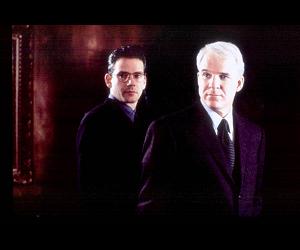 |
9. The Spanish Prisoner
"Nobody looks at a Japanese tourist."
|  |
Movies about confidence schemes and those who perpetrate them could fill their own top ten list, and most of them rely on twist after turn after twist. Therefore, picking just one for this list seems almost unfair, but once you’ve seen one con movie, you can pretty much predict where all of them are going. The exception to this rule, of course, is David Mamet’s The Spanish Prisoner. Even those versed in confidence schemes and knowing where the film is going would have a hard time predicting how all the pieces get put together to ensure that the protagonist of this film gets thoroughly fucked. Any fan of con movies—even those who don’t like Mamet—owes it to him or herself to watch this one.
Honorable mentions in this category: Confidence, Matchstick Men, The Score
8. A Beautiful Mind
"Imagine if you suddenly learned that the people, the places, the moments most important to you were not gone, not dead, but worse, had never been. What kind of Hell would that be?"
|  |
8. A Beautiful Mind
"Imagine if you suddenly learned that the people, the places, the moments most important to you were not gone, not dead, but worse, had never been. What kind of Hell would that be?"
|  |
Even though this Ron Howard movie is based on the real life of schitzophrenic John Nash, the revelation halfway through the story that several major characters are the product of Nash’s insane imagination is a staggering blow. Even more remarkable are the neat touches you don’t notice on your first viewing, like the fact that the birds don’t scatter when the unreal little girl runs across a lawn covered with them. It also helps that the acting in the film sells it so well, from Ed Harris and Paul Bettany playing fictional people to Russel Crowe and Jennifer Connely playing the deeply troubled Nash and his wife.
7. Dark City
"There is no ocean, John. There is nothing beyond the city. The only place home exists is in your head."
| 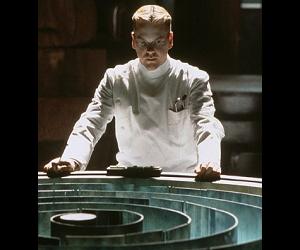 |
7. Dark City
"There is no ocean, John. There is nothing beyond the city. The only place home exists is in your head."
|  |
Speaking of Jennifer Connely, she was also one of the main actors in Dark City, a film so original it defies simple explanation. Even with the opening narration in the theatrical version of the film, the audience is challenged to figure out what is going on in this stylish sci-fi film noir and is never allowed to put it all together until the movie is almost over. The twist that blew my mind occurs when the protagonist, John Murdoch, finally reaches Shell Beach (a place of fond childhood memories), only to discover that it's nothing but a brick wall. Then, with the help of the detective, he breaks a hole in the wall and discovers that all that lies beyond it is deep space. The detective is subsequently sucked out, and as he exhales his last breath and twists into the empty abyss, he is given a beautiful panoramic view of the city, which it turns out is a floating disc in the middle of nowhere.
6. Jacob's Ladder
"If you're frightened of dying and you're holding on, you'll see devils tearing your life away. If you've made your peace, then the devils are really angels, freeing you from the Earth."
| 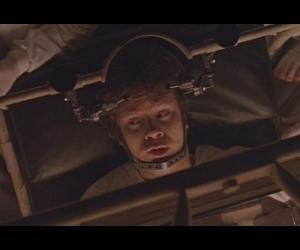 |
6. Jacob's Ladder
"If you're frightened of dying and you're holding on, you'll see devils tearing your life away. If you've made your peace, then the devils are really angels, freeing you from the Earth."
|  |
Jacob’s Ladder is a scary fucking movie. Tim Robbins plays Jacob, a veteran of the Vietnam War whose old platoon buddies are dying off one at a time under mysterious circumstances. The movie doesn’t make this list because of the unique and trippy visuals, the deep psychological mindfuck, or the fact that Elizabeth Peña has sex with Satan. It makes this list because, after Jacob is taken to heaven by a cute little Macaulay Culkin, we discover that the entire story is taking place while Jacob lies dying in triage in Vietnam, some twenty years in the past. The protagonist-being-dead twist is not unique to Jacob’s Ladder, nor is it unique to later films like the masterful The Others and the overrated The Sixth Sense; the first good example I know of comes from an old short story by Ambrose Bierce called “An Occurrence at Owl Creek Bridge.” However, it is such a shock to the system in Jacob’s Ladder—and it successfully explains a narrative that seems so wildly unexplainable—that it deserves a place on this list.
Honorable mentions in this category: The Others, The Sixth Sense
5. Psycho (1960)
"Well, if the woman up there is Mrs. Bates, who's that woman buried out in Greenlawn Cemetery?"
|  |
5. Psycho (1960)
"Well, if the woman up there is Mrs. Bates, who's that woman buried out in Greenlawn Cemetery?"
|  |
Multiple Personality Disorder (or Dissociative Identity Disorder, if you want to be more correct) is so ingrained in pop culture nowadays that it is as cliché a plot device as amnesia or a briefcase full of money. However, there was a time when this extremely rare condition—so rare many question its very existence—was a completely foreign concept to most people. Therefore, when Norman Bates came along in Alfred Hitchcock’s masterful Psycho, it was something special. Psycho is notorious for the revelation in the final act that Norman Bates’ mother is long dead, but it is important to note that it is not the only drastic twist in the narrative. The first act of the film follows Marion Crane through a fairly typical Hitchcockian setup where she takes money from her employer and runs away to parts unknown with nothing but her guilt and giddy rebelliousness to accompany her. A few minutes later, she’s dead in the trunk of her car as it sinks into the lake, leaving the movie without its protagonist before the halfway point. That’s why Psycho makes this list—not just because of the revelation at the end, but also because it psyched out the audience long before that.
Honorable mentions in this category: Identity, Primal Fear, Raising Cain
4. Fight Club
"It's called a changeover. The movie goes on, and nobody in the audience has any idea."
| 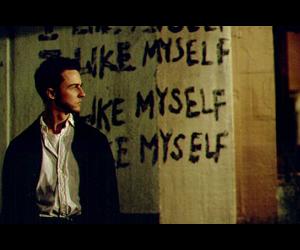 |
4. Fight Club
"It's called a changeover. The movie goes on, and nobody in the audience has any idea."
|  |
David Fincher’s Fight Club is similar to A Beautiful Mind, in that one of the main characters is revealed to be imaginary, and also to Psycho, in that multiple personalities are involved. It also uses the “unreliable narrator” trick which will be seen later on this list. However, Fight Club stands in its own category, because it melds all of these ideas and because the changeover is so completely unexpected. The movie sells itself as a quirky and stylistic exploration of the modern male’s place in society and how it interacts with his baser instincts and needs, and the hook of the story—the idea of the fight club—is enough to base a good movie on. But the movie—like the Chuck Palahniuk novel upon which it is based—takes it one step further with the revelation that the two seemingly opposite main characters are, in fact, the same person. This twist is used in such a novel and artistic way that the movie demanded a place on this list.
3. The Planet of the Apes (1968)
"The question is not so much where we are as when we are."
|  |
3. The Planet of the Apes (1968)
"The question is not so much where we are as when we are."
|  |
When George Taylor—played by acting legend Charlton Heston—sees the Statue of Liberty on the desert beaches in the forbidden zone of the planet of the apes and finally realizes where he is and what’s going on, he pounds the dirt and shouts, “You maniacs! You blew it up! Ah, damn you! God damn you all to Hell!” It’s hard for modern audiences to realize what a shock this was at the time—I personally am not old enough to tell you, either—but it is probably the ultimate science-fiction twist ending. It not only explains the story, but it clarifies the messages of the film and offers a bleak and sobering look at where our technology and civilization might take us. This is also a good way to differentiate between a good twist and a lame one, as the 2001 remake by Tim Burton offers up a different twist ending, one thrown in for the sake of being there, and one that simply cannot be explained in any rational way.
2. Star Wars: Episode V: The Empire Strikes Back
"You must unlearn what you have learned."
|  |
2. Star Wars: Episode V: The Empire Strikes Back
"You must unlearn what you have learned."
|  |
Yeah, we all know Darth Vader is Luke’s father, Anakin. But, believe it or not, there was a time when audiences were shocked by this revelation. Watch it now and imagine you didn’t actually know it to be true; it would throw you off. It’s also, most likely, the oldest plot twist in literary history, as you can trace it all the way back to Sophocles’ Oedipus the King, way back in 429 BC. When it is revealed in the next movie that Luke’s main love interest, Princess Leia, is actually his sister, people breathed a sigh of relief that their love remained unrequited. Still, when Vader reaches his prosthetic hand out toward a one-handed Luke Skywalker in The Empire Strikes Back and explains, “No, I am your father,” it remains one of the best and most successful narrative twists in the history of film.
Honorable mention in this category: The Devil’s Advocate
1. The Usual Suspects
"You think a guy like that comes this close to getting fingered and sticks his head out? If he comes up for anything, it will be to get rid of me. After that, my guess is you'll never hear from him again."
| 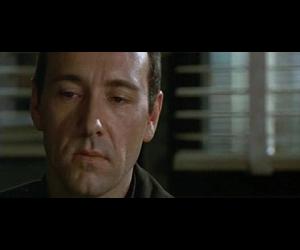 |
1. The Usual Suspects
"You think a guy like that comes this close to getting fingered and sticks his head out? If he comes up for anything, it will be to get rid of me. After that, my guess is you'll never hear from him again."
|  |
No movie, however, made me drop my jaw and stare at the screen in muted awe like The Usual Suspects. Here you have a film that seems, for almost the entire narrative, to be a simple noir-like crime drama about a bunch of guys drawn in to servitude for the ultimate criminal mastermind, Keiser Söze, as told from the perspective of a quirky cripple named Verbal Kint who doesn’t seem like he could hurt a fly. Once finished with his tale, Kint is set free by the police, and it is only then that the detective in charge looks at the wall behind him and sees the various names and images that Kint used to make his story up from whole cloth. The camera then cuts to Kint, who shakes off his limp as he walks down the block, and through clever editing, the audience is shown that Verbal Kint is, in fact, Keiser Söze. If you try to tell me you weren’t surprised by this (and weren’t spoiled), I’ll know you’re lying. But it makes the movie masterful because it makes complete sense, and it reveals so much about the nature of storytelling. Of course, the “unreliable narrator” is not a unique plot twist, but it’s a fairly difficult one to pull off, especially in film.
Honorable mention in this category: Memento
Other honorable mentions: 12 Monkeys, The Crying Game, Final (2001), The Illusionist, Lucky Number Sleven, The Prestige, Primer, Saw, Seven, The Shawshank Redemption, Soylent Green, Swimming Pool, The Wicker Man (1973)
-e. magill, 11/17/2008
|
|